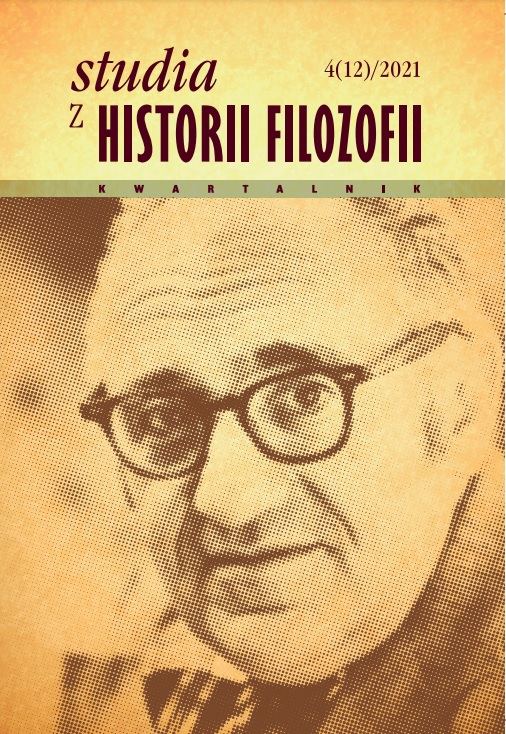Enlightenment and Social Progress – Back to the Enlightenment
DOI:
https://doi.org/10.12775/szhf.2021.019Słowa kluczowe
social progress, cosmopolitanism, moral, critizenschipAbstrakt
The world today operates in a highly fragmented manner and in constant motion. The question of social progress is tempered. Morality does not determine the direction of social development and social interest. Scientific schematizing of our social reality and education is done intentionally in order to achieve maximum profits and success in the sciences, whose justification is questionable under the influence of meeting the requirements of the time. It is therefore necessary to review the issue and return to the roots of reflection on the meaning of enlightenment and progress, hence the Enlightenment. Kant and Rousseau are very specific philosophers within the Enlightenment. In many issues they are different from the other philosophers of the Enlightenment. In many ways Kant overcomes the Enlightenment and both think about the question of social progress differently from their contemporaries.
Bibliografia
Belás Ľubomír. 1998. Dejinný rozmer filozofie osvietenstva. Prešov: MANACON.
Camps Victoria, Giner Salvador. 2000. Pohľady na občiansku kultúru. Bratislava: Kaligram.
Druckerman Pamela. 2012. A dosť! Francúzske deti nevystrájajú pri jedle. Bratislava: NOXI.
Harrington, Austin. 2006. Moderní sociální teorie. Praha: Portál.
Hinske Norbert. 1980. Kant als Herausforderung an die Gegenwart. Freiburg/München: Karl Alber.
Honneth Axel. 2000. Das Andere der Gerechtigkeit. Frankturt am Main: Shurkamp.
Kant Immanuel. 2009. Idea for a Universal History with a Cosmopolitan Aim, ed. Amélie Oksenberg Rorty, James Schmidt. 10-23. Cambridge: Cambridge University Press.
Kant Immanuel. 2007. “Conjectural beginning of human history”. In: ImmanuelKant, Anthropology, History, and Education, ed. and trans.
Robert B. Louden. 163-175. Cambridge: Cambridge University Press.
Kant Immanuel. 1996. “On the common saying: That may be correct in theory, but it is of no use in practice”. In: Immanuel Kant, Practical Philosophy, ed. Mary J. Gregor. 273-310. Cambridge: Cambridge University Press.
Kant Immanuel. 1996. “An answer to the question: What is enlightenment”. In: Immanuel Kant, Practical Philosophy, ed. Mary J. Gregor. 11-22. Cambridge: Cambridge University Press.
Kant Immanuel. 1991. “The Contest of Faculties. A Renewed Attempt to Answer the Question: Is the Human Race Continually Improving?”. In: Immanuel Kant, Political Writings, 2nd Edition, ed. Hans S. Reiss. 176-190. Cambridge: Cambridge University Press.
Kant Immanuel. 2000. Critique of the Power of Judgment. Cambridge: Cambridge University Press.
Kosík Karel. 1997. Předpotopní úvahy. Praha: Torst.
Kyslan Peter. 2018. Fenomén kultúry vo filozofii Immanuela Kanta. Prešov: Filozofická fakulta Prešovskej univerzity v Prešove.
Kyslan Peter. 2019. “Spor fakúlt a úloha filozofickej fakulty”. Studia Philosophica Kantiana, y. 9, nr. 1, 59–73.
Lawless Robert. 1996. Co je to kultura. Olomouc: Votobia.
Marquard, Odo. 1991. “Zeitalter der Weltfremdheit? Beitrag zur Analyse der Gegenwart“. In: Philosophie als Zeitdiagnose, ed. Ollig Hans-Ludwig. Darmstadt: Wissenschaftliche Buchgesselschaft.
Reitemeyer Ursula. 2007. “Kantovskij kuľturno-historičeskij nabrosok projekta všemirmo-graždanskogo obščestva”. In: Immanuil Kant: nasledie i proekt, ed. V. S. Stepin, N. V. Motrošilova. 376–393. Moskva. Kanon+.
Rousseau Jean-Jacques. 1997. “Discourse on the Sciences and Arts or First Discourse”. In: Jean-Jacques Rousseau, The Discourses and other early political writings, ed. Victor Gourevitch. 1-114. Cambridge: Cambridge University Press.
Rousseau, Jean-Jacques. 1889. Profession of faith of a Savoyard vicar. New York: Peter Eckler.
Rousseau Jean-Jacques. 1978. Schriften. Band 2. München: Carl Hanser Verlag.
Weber Max. 2011. “The Meaning of “Etical Neutrality” in Sociology and Economics”. In: Max Weber, Methodology of Social Sciences, ed. and trans. Edward A. Shils, Henry A. Finch. 1-48. New Brunswick, London: Transaction Publishers.
Zákutná Sandra. 2015. “Philosophy of History of Adam Ferguson and Immanuel Kant”. Estudos Kantianos, vol. 3, nr. 1: 75–82.
Pobrania
Opublikowane
Jak cytować
Numer
Dział
Licencja

Utwór dostępny jest na licencji Creative Commons Uznanie autorstwa – Bez utworów zależnych 4.0 Międzynarodowe.
Statystyki
Liczba wyświetleń i pobrań: 1413
Liczba cytowań: 0



